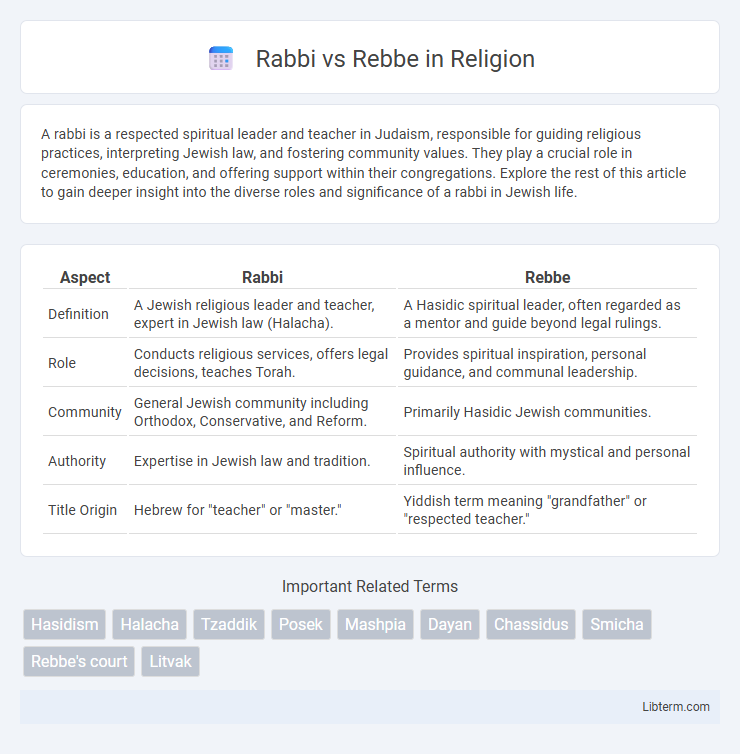A rabbi is a respected spiritual leader and teacher in Judaism, responsible for guiding religious practices, interpreting Jewish law, and fostering community values. They play a crucial role in ceremonies, education, and offering support within their congregations. Explore the rest of this article to gain deeper insight into the diverse roles and significance of a rabbi in Jewish life.
Table of Comparison
| Aspect | Rabbi | Rebbe |
|---|---|---|
| Definition | A Jewish religious leader and teacher, expert in Jewish law (Halacha). | A Hasidic spiritual leader, often regarded as a mentor and guide beyond legal rulings. |
| Role | Conducts religious services, offers legal decisions, teaches Torah. | Provides spiritual inspiration, personal guidance, and communal leadership. |
| Community | General Jewish community including Orthodox, Conservative, and Reform. | Primarily Hasidic Jewish communities. |
| Authority | Expertise in Jewish law and tradition. | Spiritual authority with mystical and personal influence. |
| Title Origin | Hebrew for "teacher" or "master." | Yiddish term meaning "grandfather" or "respected teacher." |
Defining Rabbi and Rebbe: Key Differences
A Rabbi is a Jewish religious leader and teacher who has received formal ordination to interpret Jewish law, provide guidance, and lead community services. A Rebbe, primarily within Hasidic Judaism, serves not only as a Torah scholar but also as a spiritual mentor and charismatic guide with a close, personal relationship to followers. The key difference lies in the Rebbe's combined role of religious authority and inspirational leadership, often seen as a spiritual conduit, whereas a Rabbi typically functions as a halakhic expert and community rabbinic authority.
Historical Origins of Rabbi and Rebbe Roles
The roles of Rabbi and Rebbe have distinct historical origins rooted in Jewish religious leadership. The title "Rabbi" originates from the Hebrew word meaning "my teacher" and emerged during the late Second Temple period as a scholarly authority in Jewish law and scripture. In contrast, "Rebbe," primarily used in Hasidic Judaism, evolved in the 18th century to denote a spiritual master who serves as both a religious guide and a communal leader with a personal, mystical connection to followers.
Educational Paths: Rabbi vs Rebbe
Educational paths for a Rabbi typically involve formal seminary training, including comprehensive study of Jewish law, Talmud, and theology, often completed in accredited yeshivas or rabbinical schools. In contrast, becoming a Rebbe usually requires an intensive, lifelong mentorship under an established Rebbe, emphasizing spiritual guidance, mystical teachings, and Hasidic philosophy. While both roles demand deep textual knowledge, the Rabbi's education prioritizes legal scholarship and community leadership, whereas the Rebbe's path centers on personalized spiritual leadership and Hasidic tradition.
Authority and Influence in the Community
A Rabbi traditionally serves as a learned teacher and legal authority in Jewish law, providing guidance through formal study and interpretation of religious texts. A Rebbe, particularly within Hasidic communities, holds a charismatic spiritual leadership role, acting as a direct conduit to divine inspiration and exerting profound personal influence over followers. While Rabbis emphasize halachic rulings and education, Rebbes embody a more intimate, mystical authority that shapes the community's spiritual and social life.
Spiritual Leadership: Distinct Approaches
Rabbi and Rebbe represent distinct forms of spiritual leadership in Judaism, with rabbis primarily serving as teachers and legal authorities who interpret Jewish law and guide their communities in religious practice. The Rebbe, particularly in Hasidic tradition, acts as a spiritual mentor and charismatic leader who provides personalized guidance and inspires followers through mystical insight and example. This differentiation highlights the rabbi's focus on scholarly leadership versus the rebbe's role in fostering deep spiritual connection and communal identity.
Rabbi in Mainstream Judaism
Rabbi in mainstream Judaism serves as a religious leader, teacher, and authority on Jewish law, ordained through rigorous study and rabbinical seminary programs. Their role includes leading synagogue services, offering pastoral care, and providing guidance on halakhic matters, reflecting a broad spectrum of Jewish denominations such as Orthodox, Conservative, and Reform. Rabbis are pivotal in maintaining Jewish traditions, education, and community cohesion within mainstream Jewish life.
Rebbe in Hasidic Tradition
In Hasidic tradition, the Rebbe serves as both a spiritual leader and a personal guide, embodying a direct divine connection and providing mystical insights beyond conventional rabbinic roles. Unlike a Rabbi, who primarily functions as a halachic authority and community teacher, the Rebbe is revered as a charismatic figure with prophetic qualities and a source of blessings. This role emphasizes the transmission of Hasidic teachings and fostering communal cohesion through personalized counsel and spiritual elevation.
Daily Duties and Responsibilities
Rabbi daily duties include teaching Jewish law, leading synagogue services, officiating life-cycle events, and providing pastoral care to congregants. Rebbe responsibilities often extend beyond these tasks by offering spiritual guidance, delivering communal inspiration, and fostering deep personal mentorship within Hasidic communities. While Rabbis focus on halachic scholarship and community leadership, Rebbes serve as charismatic spiritual leaders embodying mystical teachings and communal unity.
Relationships with Followers
A Rabbi primarily serves as a teacher and legal authority within the Jewish community, fostering individual guidance through study and interpretation of Jewish law. A Rebbe often embodies a spiritual leader with a personal, mystical bond, providing not only guidance but also emotional and inspirational support. The Rebbe's relationships with followers are deeply personal, emphasizing loyalty and communal unity beyond traditional rabbinic roles.
Modern Perceptions and Evolving Roles
Modern perceptions distinguish a Rabbi primarily as a legal scholar and community leader, while a Rebbe is viewed as a spiritual guide with charismatic authority, especially within Hasidic communities. The evolving roles reflect a shift where Rabbis engage more in academic and interfaith dialogue, whereas Rebbes emphasize personal mentorship and mystical teachings. Digital media and globalization have expanded both figures' influence, blending traditional leadership with contemporary outreach.
Rabbi Infographic

 libterm.com
libterm.com